The Chromebook Pixel (2015) Review
by Brandon Chester on March 16, 2015 8:00 AM EST- Posted in
- Laptops
- Chrome OS
- Chromebook
- Chromebook Pixel
CPU Performance
Chrome OS is extremely lightweight, which makes sense for an operating system that has to run on processors that range from Intel's Core i7 at the high end, to Intel Atom and ARM processors at the low end. Most devices running Chrome OS are closer to that lower end, and that coupled with the web application nature of Chrome OS doesn't make it a large target for benchmark developers. The situation is arguably even worse than mobile benchmarking since the only benchmarks a device can be tested in are web benchmarks, but we have to work with what we have. The new Chromebook Pixel is powered by Intel's Core i5-5200U processor, which is one of Intel's new Broadwell-U parts.
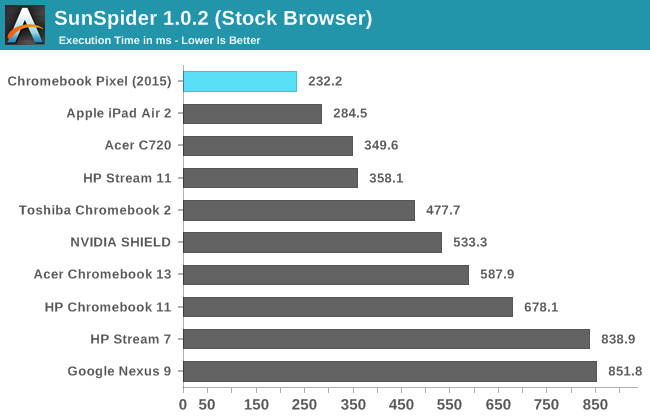
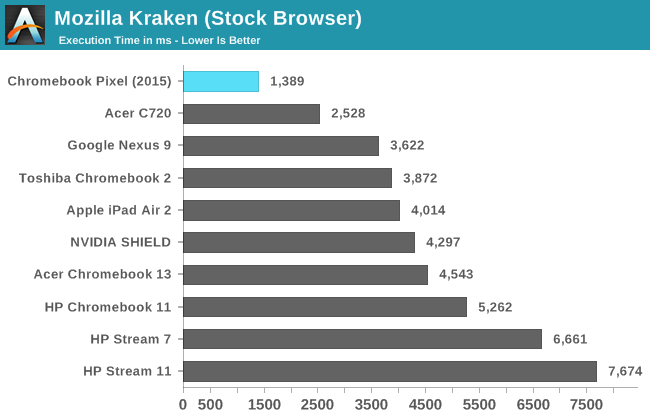
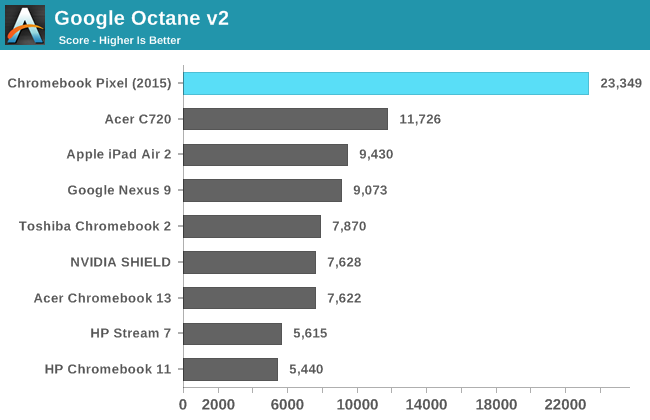
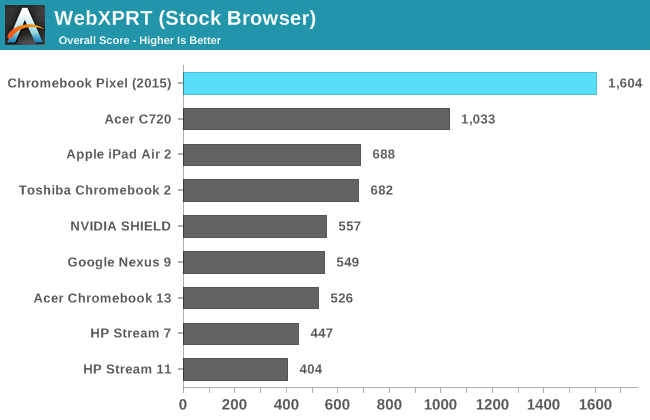
| Additional Performance Results | ||||
| Acer C720 | Acer CB13 | Toshiba Chromebook 2 | Chromebook Pixel (2015) | |
| CrXPRT | 96 | 55 | 61 | 161 |
| Spacerocks (WebGL - FPS) | 18 | 30 | 11 | 45 |
The CPU performance of the original Pixel could be described as completely overkill for running Chrome OS, and the same is true for this year's iteration. The Pixel gives you whats is undoubtedly the smoothest and fastest Google Chrome experience available. While I find the performance of an Intel i5 to be unnecessary to do something as simple as run Chrome and web apps, it definitely comes in handy if you're running some other version of Linux overtop of Chrome OS.
WiFi Performance
The 2013 Chromebook Pixel had dual spatial stream 802.11n WiFi and Bluetooth 3.0. In early 2013, this was fairly common among laptops, although 802.11ac adoption on high end laptops began not long after. The 2015 Chromebook Pixel uses Intel's Intel 7260 WiFi + BT 4.0 module, with 2x2 802.11ac support. This brings the max theoretical WiFi speed up to 866Mbps, a substantial improvement over the 300Mbps max on the 2013 model. Real world performance will almost always be lower than theoretical maximums, and to test WiFi performance I've used iPerf to get an idea of what the maximum throughput is on the Pixel.
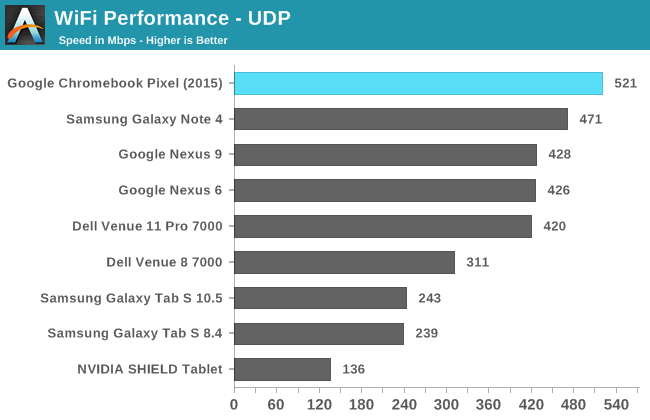
In most of our tests I've compared the Pixel to other Chromebooks, tablets, and smartphones. This is mostly due to the previously mentioned benchmarking limitations on Chrome OS. To keep consistent with this, and to avoid making unfair comparisons to laptops which aren't tested using iPerf, I've just run the Pixel through our smartphone/tablet WiFi benchmark. This still gives an idea of how fast the Pixel is, without comparing it to other laptops that were not tested in the exact same manner.










123 Comments
View All Comments
Selden - Tuesday, March 17, 2015 - link
New Macbook: mobile processor, 480px camera, *1* USB Type-C port, 5 Gb iDrive space. $1299.New Pixel: i5, 720px camera, 2 USB Type-C, two USB Type A ports, 1 Tb of Google Drive space for 3 years. $999
I'
BackInAction - Monday, March 16, 2015 - link
I don't think Google intends for this to be something Joe Public will purchase. More of a ChromeOS Developer tool?Any comparison between this and other laptops is meaningless because it isn't meant to be compared with anything.
chlamchowder - Monday, March 16, 2015 - link
I don't know if it's the best idea to develop for a device more powerful than what most of the userbase will buy.The 64 GB version looks like a decent platform to put Linux on, as long as you don't try to store too much. After all, the lowest end original Surface Pro had 64 GB, and Windows programs tend to be heavier on storage. But I'm not sure I'd pay $1300 to tinker with Linux on it.
coder543 - Monday, March 16, 2015 - link
In general, developer machines *have* to be more powerful than the consumer machines the software will run on. Just because you're developing on a powerful rig, doesn't mean you won't test your software on weaker hardware along the way.It's not exactly the same thing, but a great example of this is game development. I literally could not run the Unreal Engine 4 development tools reliably on a Mac mini with 4GB of RAM. It would crash often due to running out of memory. Once I upgraded it to have 16GB of RAM, these problems all disappeared. UE4 allows you to develop games for everything from smartphones to the most powerful desktops, yet there is absolutely no way you could run the developer tools on a smartphone -- even if it is the platform you're targeting, and you don't think it's good to develop on more powerful hardware than you're targeting.
chlamchowder - Monday, March 16, 2015 - link
I said develop for, not develop on. I really doubt developers will want to code right on Chrome OS. They're probably following a similar model to cell phone app development, where you write/compile your code on a 'real' machine, and then package/deploy it to a test machine (cell phone, or Chromebook).With that model, using the Chromebook Pixel as a test platform might not be the best idea. An app that performs decently on the Pixel might not do so well on lower end Chromebooks.
I suppose you could drop a full blown Linux distro or Windows on a Chromebook Pixel and use it for coding...but then limited storage could be an issue.
extide - Monday, March 16, 2015 - link
But its not a *testing* platform, it's a *developing* platform. Also, great for users who'd like to put Linux on.chlamchowder - Monday, March 16, 2015 - link
Developing *on* Chrome OS seems like a horrible idea, even on the Pixel.To start, Chrome OS doesn't come with any development tools (though there's a messy way to get GCC on it). Assuming you manage to get a build environment set up, you then have to deal with very limited storage. Want to store local copies of several large projects? GLHF. Then, what about compilation times? A Broadwell i5 ULV chip is great for an ultrabook, but a desktop with an adequately cooled, higher clocked i7 will blow it out of the water.
Any laptop or desktop for the same price is much better for coding.
melgross - Monday, March 16, 2015 - link
A developer tool doesn't need to be made out of aluminum. No, Google is clearly trying to make a high end laptop to compete with Apple. Since Chrome still isn't nearly as useful as either Windows of OS X, this is a very limited device. Are they worth more than $1,000? No way nearly.Hanoveur - Monday, March 16, 2015 - link
No, Google is on record saying they gave these away to the developers at the Google Developers Conference and were simply making them available for the general public to buy. They aren't expecting to sell many of them. Look it up.And why wouldn't someone buy this? People could buy a Toyota Corolla to simply drive from point A to point B, but there are those that choose the Infinity to do exactly the same thing. It's all about preference. It might seem insane to some people, but people like what they like. Everyone elses world and tastes do not revolve around yours.
chlamchowder - Monday, March 16, 2015 - link
It's just difficult to imagine who's tastes this would fit.